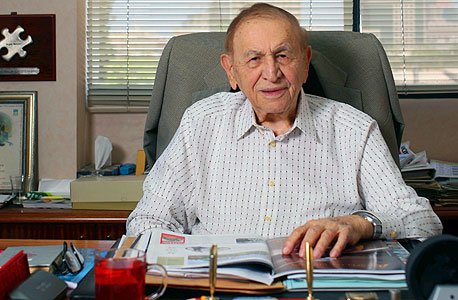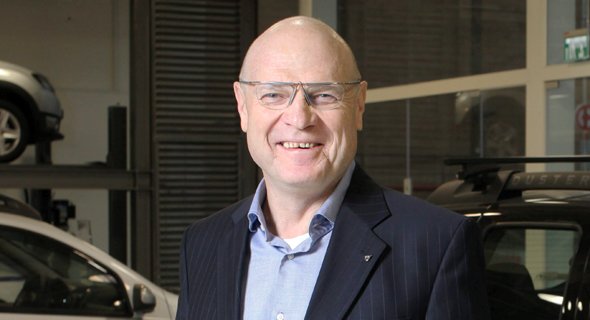מורשת גדולי האומה
בזכותם קיים
beta
The Carasso Family
The Carasso family is one of the wealthiest families in the State of Israel. The family controls the Renno, Nissan, and Dacia agencies in Israel through the "Bnei Moshe Carasso" group. According to estimates from 2004, the group's real estate holdings were valued at around 2 billion shekels, with its automotive business estimated at around 1 billion shekels. Until 2003, the family also held ownership in IDB Group and Discount Bank alongside the Recanati family.
Moshe Carasso
The family patriarch, Moshe Carasso, was born in Thessaloniki on May 11, 1885, to a family originally from the vicinity of Lake Como in Italy (the Carasso name preserves the name of their town of origin, Carasso, located about 50 kilometers north of Como, currently within Switzerland's borders). His father was a wholesale merchant and a leader in the Salonika Jewish community. Moshe received a traditional education during his childhood and was active in the Zionist organization "Kadimah." At the age of 14, he left his father's business and took over the family's grocery store, eventually becoming one of the leading food merchants in Salonika. In 1914, he married Tzipora (Pulva), and they had two sons: Chaim (1914) and Aryeh (1915). In 1917, the family relocated to Piraeus, Greece, where Moshe's business expanded, making him one of the city's prosperous merchants. In Piraeus, they had three more children: Miriam, Bella (the mother of businessman Yosef David Hachami), and Benjamin and Shlomo, who were born in Israel.
In 1924, due to the Greco-Turkish War, the Carasso family immigrated to the Land of Israel and settled in Jaffa. Their children, who already knew Hebrew from their parents, attended the Herzliya Gymnasium. Moshe Carasso partnered with Moshe (Musa) Matlon and Yehuda and Nahum Moses to acquire and market land. Among other purchases and sales, they acquired properties in the Florentin neighborhood, a commercial center in Tel Aviv, and Giv'at Moshe (bordering Tel Aviv-Jaffa). Their family home, a ten-room house with a spacious living room, was built on Nahalat Binyamin Street. Meir Dizengoff asked Moshe Carasso to establish "Ophir" at Geula Bergson Street (the building later served as the "Liquid" nightclub in the 1980s), which was the second cinema in the city after the "Eden" cinema. This move led to significant losses for the Carasso family due to their lack of experience and knowledge in the field. These losses were offset by property sales in Greece. Moshe Carasso also founded the textile company "Sharon" and the shipping company "Al-Yam."
In 1933, Moshe Carasso became involved in the automotive industry when Isaac Arditi, who arrived in Israel from Alexandria, Egypt, that year, received the agency and marketing rights for General Motors in Israel. He opened an automobile dealership in Jaffa on Jerusalem Boulevard (then known as King George Street) in partnership with Moshe Carasso, named "Muiz Carasso, Automobile Department."
Moshe Carasso was also active in public affairs. He led a group of Salonika Jews who were the first dockworkers in the Tel Aviv port. He served as a judge at the Hebrew Peace Court, was involved in the Jewish Settlement Association in Tel Aviv-Jaffa, and served as the president of the Greek Immigrants Association.
In 1935, Moshe Carasso's friend from Salonika, Leon Recanati, came to Israel and expressed interest in investment. From Carasso, he heard that "there's an Anglo-Palestine Bank here, that of the Ashkenazim, and there's also a bank of the Yemenites, but there isn't a Sephardic bank... to help the newcomers from Yemen who don't know any language." This led to the establishment of Discount Bank. Moshe Carasso was instrumental in founding the bank and marketing it to its customers, but he left control of the bank to Recanati.
In 1933, Chaim Carasso was sent to study at the University of London at the age of 17, while Aryeh was sent to study in Bayreuth, Germany. In 1933, they both returned to Israel and entered the automotive business. Chaim opened a truck sales agency in Petah Tikva and, together with his brother and father, imported large quantities of automotive parts. As a result, the family had a large supply of spare parts during World War II, which they obtained from the British military and brought to Israel.
In 1947, Aryeh Carasso traveled to London and persuaded the British car manufacturer "Hillman" to import its cars to Israel. In 1948, "Moshe Carasso and Sons" received the agency to sell Renault cars in the young State of Israel, replacing the Arab importer who had fled the country.
Chaim Carasso purchased 150 dunams (approximately 37 acres) in Kfar Shmaryahu, most of which he sold after a real estate crisis. On the remaining two dunams, he built his home. Over the years, he engaged in various business sectors, including loans to diamond merchants, importing and packaging tea, importing wood from Finland, carpets from Iran (brought by new immigrants), televisions from Italy, photocopiers, and more.
In 1962, Moshe Carasso passed away. He divided control of his businesses equally among his four sons. Chaim served as the operational manager, while Aryeh handled the company's representation in dealings outside, particularly with car manufacturers and government officials. Aryeh also served as the chairman of the Importers' Association and the President of the Chambers of Commerce Union. Chaim, on the other hand, argued that the third-generation family members lacked talent, which would make them able managers of the business. In 1965, they sold the textile company "Sharon" to the Leumi Group and went into the automobile business entirely.
Conclusion
The Carasso family, originally from Thessaloniki, Greece, has a long history of business involvement in Israel, particularly in the automotive industry. Moshe Carasso, the family patriarch, played a significant role in their initial success in Israel, and his sons continued to expand and manage the family's various business interests, including car dealerships and real estate holdings. The family's involvement in the automotive sector, including representing car manufacturers like Renault, contributed to their wealth and prominence in Israel.
The family patriarch, Moshe Carasso, was born in Thessaloniki on May 11, 1885, to a family originally from the vicinity of Lake Como in Italy (the Carasso name preserves the name of their town of origin, Carasso, located about 50 kilometers north of Como, currently within Switzerland's borders). His father was a wholesale merchant and a leader in the Salonika Jewish community. Moshe received a traditional education during his childhood and was active in the Zionist organization "Kadimah." At the age of 14, he left his father's business and took over the family's grocery store, eventually becoming one of the leading food merchants in Salonika. In 1914, he married Tzipora (Pulva), and they had two sons: Chaim (1914) and Aryeh (1915). In 1917, the family relocated to Piraeus, Greece, where Moshe's business expanded, making him one of the city's prosperous merchants. In Piraeus, they had three more children: Miriam, Bella (the mother of businessman Yosef David Hachami), and Benjamin and Shlomo, who were born in Israel.
In 1924, due to the Greco-Turkish War, the Carasso family immigrated to the Land of Israel and settled in Jaffa. Their children, who already knew Hebrew from their parents, attended the Herzliya Gymnasium. Moshe Carasso partnered with Moshe (Musa) Matlon and Yehuda and Nahum Moses to acquire and market land. Among other purchases and sales, they acquired properties in the Florentin neighborhood, a commercial center in Tel Aviv, and Giv'at Moshe (bordering Tel Aviv-Jaffa). Their family home, a ten-room house with a spacious living room, was built on Nahalat Binyamin Street. Meir Dizengoff asked Moshe Carasso to establish "Ophir" at Geula Bergson Street (the building later served as the "Liquid" nightclub in the 1980s), which was the second cinema in the city after the "Eden" cinema. This move led to significant losses for the Carasso family due to their lack of experience and knowledge in the field. These losses were offset by property sales in Greece. Moshe Carasso also founded the textile company "Sharon" and the shipping company "Al-Yam."
In 1933, Moshe Carasso became involved in the automotive industry when Isaac Arditi, who arrived in Israel from Alexandria, Egypt, that year, received the agency and marketing rights for General Motors in Israel. He opened an automobile dealership in Jaffa on Jerusalem Boulevard (then known as King George Street) in partnership with Moshe Carasso, named "Muiz Carasso, Automobile Department."
Moshe Carasso was also active in public affairs. He led a group of Salonika Jews who were the first dockworkers in the Tel Aviv port. He served as a judge at the Hebrew Peace Court, was involved in the Jewish Settlement Association in Tel Aviv-Jaffa, and served as the president of the Greek Immigrants Association.
In 1935, Moshe Carasso's friend from Salonika, Leon Recanati, came to Israel and expressed interest in investment. From Carasso, he heard that "there's an Anglo-Palestine Bank here, that of the Ashkenazim, and there's also a bank of the Yemenites, but there isn't a Sephardic bank... to help the newcomers from Yemen who don't know any language." This led to the establishment of Discount Bank. Moshe Carasso was instrumental in founding the bank and marketing it to its customers, but he left control of the bank to Recanati.
In 1933, Chaim Carasso was sent to study at the University of London at the age of 17, while Aryeh was sent to study in Bayreuth, Germany. In 1933, they both returned to Israel and entered the automotive business. Chaim opened a truck sales agency in Petah Tikva and, together with his brother and father, imported large quantities of automotive parts. As a result, the family had a large supply of spare parts during World War II, which they obtained from the British military and brought to Israel.
In 1947, Aryeh Carasso traveled to London and persuaded the British car manufacturer "Hillman" to import its cars to Israel. In 1948, "Moshe Carasso and Sons" received the agency to sell Renault cars in the young State of Israel, replacing the Arab importer who had fled the country.
Chaim Carasso purchased 150 dunams (approximately 37 acres) in Kfar Shmaryahu, most of which he sold after a real estate crisis. On the remaining two dunams, he built his home. Over the years, he engaged in various business sectors, including loans to diamond merchants, importing and packaging tea, importing wood from Finland, carpets from Iran (brought by new immigrants), televisions from Italy, photocopiers, and more.
In 1962, Moshe Carasso passed away. He divided control of his businesses equally among his four sons. Chaim served as the operational manager, while Aryeh handled the company's representation in dealings outside, particularly with car manufacturers and government officials. Aryeh also served as the chairman of the Importers' Association and the President of the Chambers of Commerce Union. Chaim, on the other hand, argued that the third-generation family members lacked talent, which would make them able managers of the business. In 1965, they sold the textile company "Sharon" to the Leumi Group and went into the automobile business entirely.
Conclusion
The Carasso family, originally from Thessaloniki, Greece, has a long history of business involvement in Israel, particularly in the automotive industry. Moshe Carasso, the family patriarch, played a significant role in their initial success in Israel, and his sons continued to expand and manage the family's various business interests, including car dealerships and real estate holdings. The family's involvement in the automotive sector, including representing car manufacturers like Renault, contributed to their wealth and prominence in Israel.
- משפחת קרסו – ויקיפדיהhe.wikipedia.org
- קבוצת קרסו חוגגת 80 שנה להיווסדהבני משפחת קרסו לדורותיה, עובדי הקבוצה ובכירי ענף הרכב, המשק והכלכלה השתתפו באירוע לציון 80 שנה לפעילות קבוצת קרסוgear.co.il

